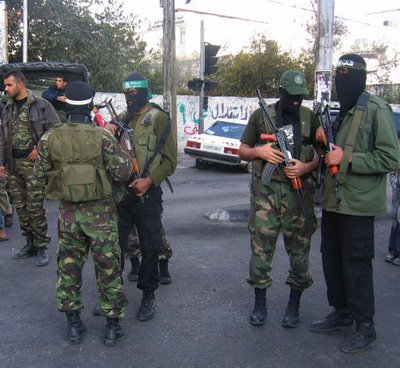
Photo from Raising Yousuf,
This cogent comparison of U.S. policies toward the Occupied Palestinian Territories and Lebanon was offered by an anonymous commenter at Raising Yousuf, Laila El-Haddad's informative blog from Gaza. It undoubtedly springs from its own biases, but nonetheless is worth thinking about.
(Mohammed Dahlan is a Gazan Palestinian legislator long involved with armed Palestinian factions and a member of a younger generation of Palestinian leadership not coming out of Hamas, the Islamist faction that won the last elections.)
- the US does not deal with the president in Lebanon, and only deals with the president in Palestine;
- the US says that the [Siniora] government is democratically elected and should be supported, but opposes the democratically elected government in Palestine and calls for its punishment;
- the US is opposed to unarmed demonstrations in Lebanon but supports armed demonstrations by Dahlan gangs in Palestine;
- the US calls for disarming of militias in Lebanon, but arms and finances militias in Palestine;
- the US is opposed to early elections in Lebanon, but supports early elections in Palestine;
- the US is opposed to a national unity government in Lebanon and also opposes one in Palestine--the idea of national unity bothers the US it seems;
- the US calls for Syria to not intervene in Lebanon but wants Syria to intervene in Palestine to support US/Israeli puppets;
- the US wants to punish assassins in Lebanon, but the US supports Israeli and Dahlan assassinations in Palestine, and the assassins there receive US financial and military support.
Even the New York Times seems to admit that by pushing Palestinian president Mahmoud Abbas to call early elections of dubious legality to oust Hamas, the U.S. is playing with unknown fires.
Oh yeah, there are also ordinary living, breathing people involved, as well as grand imperial strategies and men with guns.Polls show that support for Hamas has been slipping because of the economic crisis facing the Palestinians, worsened by the cutoff of Western direct aid to the Hamas-run Palestinian Authority, and the security chaos in Gaza and large parts of the West Bank.
But Hamas could win new elections and also defeat Mr. Abbas for the presidency, which could put an end for some time to the idea of a two-state solution, with an independent Palestine next to Israel. Hamas recognizes Israel as a fact, but does not accept its right to exist permanently on what it considers Islamic land.
A poll released Sunday placed Mr. Haniya and Mr. Abbas in a dead heat in a presidential race and suggested that Fatah is six percentage points ahead of Hamas, 42 to 36, in a parliamentary election. But the poll, conducted by the independent Palestinian Center for Policy and Survey Research, has a margin of sampling error of plus or minus three percentage points, meaning that the two factions could be tied. Mr. Abbas also faces problems because he has done little to reform Fatah or to fire old cronies, who are popularly considered corrupt and out of touch with the lives of ordinary Palestinians.
No comments:
Post a Comment